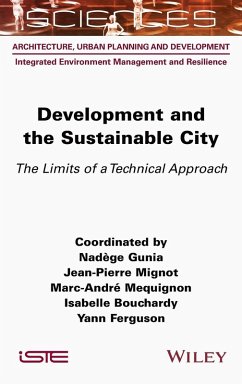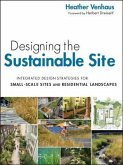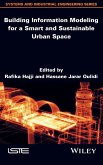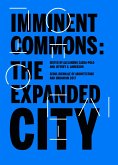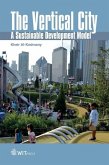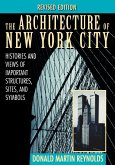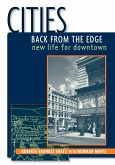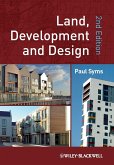Nadège Gunia, Jean-Pierre Mignot, Marc-André Mequignon, Isabelle Bouchardy, Yann Ferguson
Development and the Sustainable City
The Limits of a Technical Approach
Nadège Gunia, Jean-Pierre Mignot, Marc-André Mequignon, Isabelle Bouchardy, Yann Ferguson
Development and the Sustainable City
The Limits of a Technical Approach
- Gebundenes Buch
- Merkliste
- Auf die Merkliste
- Bewerten Bewerten
- Teilen
- Produkt teilen
- Produkterinnerung
- Produkterinnerung
This book examines the city and its rapid growth, as well as the sustainability issues it poses, in several ways. First, there is a critical approach to development, as expressed by the concept of sustainable development. The city, as a complex system, primarily refers to questions of sustainability performance, which we believe to be capable of resolving problems and difficulties, even when viewed from a local perspective, and therefore from the point of view of the areas in which it must act. Lastly, the issue of sustainability cannot be addressed without contemplating and concluding how…mehr
Andere Kunden interessierten sich auch für
![Designing the Sustainable Site Designing the Sustainable Site]() Heather L VenhausDesigning the Sustainable Site64,99 €
Heather L VenhausDesigning the Sustainable Site64,99 €![Building Information Modeling for a Smart and Sustainable Urban Space Building Information Modeling for a Smart and Sustainable Urban Space]() H Jarar OulidiBuilding Information Modeling for a Smart and Sustainable Urban Space159,99 €
H Jarar OulidiBuilding Information Modeling for a Smart and Sustainable Urban Space159,99 €![Imminent Commons: The Expanded City Imminent Commons: The Expanded City]() Imminent Commons: The Expanded City40,00 €
Imminent Commons: The Expanded City40,00 €![The Vertical City: A Sustainable Development Model The Vertical City: A Sustainable Development Model]() Kheir Al-KodmanyThe Vertical City: A Sustainable Development Model328,99 €
Kheir Al-KodmanyThe Vertical City: A Sustainable Development Model328,99 €![The Architecture of New York City The Architecture of New York City]() Donald Martin ReynoldsThe Architecture of New York City62,99 €
Donald Martin ReynoldsThe Architecture of New York City62,99 €![Cities Back from the Edge Cities Back from the Edge]() Roberta Brandes GratzCities Back from the Edge43,99 €
Roberta Brandes GratzCities Back from the Edge43,99 €![Land, Development and Design Land, Development and Design]() Paul SymsLand, Development and Design77,99 €
Paul SymsLand, Development and Design77,99 €-
-
-
This book examines the city and its rapid growth, as well as the sustainability issues it poses, in several ways. First, there is a critical approach to development, as expressed by the concept of sustainable development. The city, as a complex system, primarily refers to questions of sustainability performance, which we believe to be capable of resolving problems and difficulties, even when viewed from a local perspective, and therefore from the point of view of the areas in which it must act. Lastly, the issue of sustainability cannot be addressed without contemplating and concluding how acceptable it is to the populations concerned. All challenges raised by the urban character of the city are therefore linked to the more general question of how to define the concept of sustainable development and the sustainable city as a key area of concern.
Produktdetails
- Produktdetails
- Verlag: Wiley
- Seitenzahl: 304
- Erscheinungstermin: 4. Februar 2025
- Englisch
- Abmessung: 234mm x 156mm x 18mm
- Gewicht: 594g
- ISBN-13: 9781789451849
- ISBN-10: 1789451841
- Artikelnr.: 72702692
- Herstellerkennzeichnung
- Libri GmbH
- Europaallee 1
- 36244 Bad Hersfeld
- gpsr@libri.de
- Verlag: Wiley
- Seitenzahl: 304
- Erscheinungstermin: 4. Februar 2025
- Englisch
- Abmessung: 234mm x 156mm x 18mm
- Gewicht: 594g
- ISBN-13: 9781789451849
- ISBN-10: 1789451841
- Artikelnr.: 72702692
- Herstellerkennzeichnung
- Libri GmbH
- Europaallee 1
- 36244 Bad Hersfeld
- gpsr@libri.de
Nadège Gunia is Senior Lecturer in Management at the Université Paul Sabatier, France. Her research focuses on cities at all scales and on global cost analysis. Jean-Pierre Mignot is a researcher in Economic Sciences at the Université Paul Sabatier, France. His research focuses on sustainable development and its application to cities. Marc-André Mequignon is a qualified architect and teacher-researcher at the Université Paul Sabatier, France. His research focuses on sustainable development and its applications in buildings and cities. Isabelle Bouchardy is Senior Lecturer in Management at the Université Paul Sabatier, France. She specializes in public strategic management, service performance measurement tools and organizational change representation among other topics. Yann Ferguson is a sociologist of cities and work at INRIA, France, a research associate at Jean Jaurès University and Scientific Director of the LaborIA research program. His research focuses on the instrumentation of human decisions in complex environments.
Introduction ix
Jean-Pierre MIGNOT
Chapter 1 From Development to Sustainable Development: Stakes and Issues
Around the Sustainable City 1
Jean-Pierre MIGNOT
1.1 Introduction 1
1.2 Development: a concept, a history and its limits 3
1.2.1 The question of economic development 4
1.2.2 A brief history of a concept 5
1.2.3 Return to a definition and its consequences 8
1.2.4 Development and growth: a functional approach 12
1.2.5 Development, productivism and consumer society 13
1.2.6 The environmental consequences of development 17
1.3 Economic development and collateral damage 21
1.3.1 Production, consumption and fossil fuels 22
1.3.2 From economic development to endangering the planet 28
1.4 The neoliberal city and the environment 38
1.4.1 A redefinition of the neoliberal city 39
1.4.2 From the Fordist city to the neoliberal city 41
1.4.3 Population growth, economic development and urbanization 44
1.4.4 Urbanization and environment 46
1.5 From sustainable development to sustainable cities: issues and limits
54
1.5.1 Origins, foundations and evolution of the concept of sustainable
development 55
1.5.2 A critical approach to the concept of sustainable development 69
1.5.3 The sustainable city and its limits 83
1.6 To not conclude 94
1.7 References 96
Chapter 2 The City, Decision-Making Tools and Performance 103
Marc-André MEQUIGNON and Jean-Pierre MIGNOT
2.1 Introduction 103
2.2 The city approached as a system 104
2.2.1 The city, a complex system 104
2.2.2 The city, a complexity in motion 105
2.2.3 The city: the constraints of sustainability 106
2.2.4 Difficulties and priorities for the future 109
2.3 The city of the future 111
2.3.1 Avenues for improvement 111
2.3.2 Interdisciplinarity, a necessity 113
2.3.3 Technological change and the city 124
2.4 Proposal for an approach to improving decision support tools 128
2.4.1 A multidisciplinary approach to the design of decision support tools
128
2.4.2 Decision support tools and their place in the project process 129
2.4.3 Multidisciplinary approach to tool design 130
2.5 The city and LCA 132
2.5.1 Maturities of the different aspects of LCA 132
2.5.2 LCA, an unsuitable tool for the city 135
2.6 Agenda 21, a dedicated tool 142
2.6.1 Probable causes of a standstill 142
2.6.2 Ways to avoid becoming bogged down again 143
2.7 Conclusion 143
2.8 References 145
Chapter 3 Rural Eco-territoriality or the Subtle Alchemy Between Locality
and Globality 149
Isabelle BOUCHARDY
3.1 Introduction 149
3.2 Rural territory: what does it mean? 150
3.2.1 The state of affairs 150
3.2.2 Specificities of identity 155
3.3 "Glocalization" of the territory 158
3.3.1 Globality 160
3.3.2 Locality 162
3.4 Sustainable rurality 165
3.4.1 Radical or incremental change? 165
3.4.2 Strategic areas of action 168
3.5 Prequel 192
3.5.1 A neglected model 194
3.5.2 Moderation versus austerity 198
3.6 References 202
Chapter 4 The Sustainable City, Between Political Project and Theoretical
Cooling 209
Yann FERGUSON
4.1 Introduction 209
4.2 The plan: a positivist paradigm of the modern city 212
4.2.1 Progress as a regulatory ideal 213
4.2.2 Science as a resolutive modality 218
4.2.3 The state's omniscience and omnipotence 222
4.3 The urban project, operational paradigm of the sustainable city 227
4.3.1 Uncertainty as regulatory disillusionment 228
4.3.2 Partnership as a resolutive modality 232
4.3.3 The territory as a legitimate actor 237
4.4 The political nature of creating the sustainable city 242
4.4.1 The instrumentation of public action: from the "what" to the "how"
242
4.4.2 A semi-elitist and unitary democracy 250
4.4.3 The sustainable city: a standardized and denatured politics? 255
4.5 Conclusion 261
4.6 References 262
List of Authors 275
Index 277
Jean-Pierre MIGNOT
Chapter 1 From Development to Sustainable Development: Stakes and Issues
Around the Sustainable City 1
Jean-Pierre MIGNOT
1.1 Introduction 1
1.2 Development: a concept, a history and its limits 3
1.2.1 The question of economic development 4
1.2.2 A brief history of a concept 5
1.2.3 Return to a definition and its consequences 8
1.2.4 Development and growth: a functional approach 12
1.2.5 Development, productivism and consumer society 13
1.2.6 The environmental consequences of development 17
1.3 Economic development and collateral damage 21
1.3.1 Production, consumption and fossil fuels 22
1.3.2 From economic development to endangering the planet 28
1.4 The neoliberal city and the environment 38
1.4.1 A redefinition of the neoliberal city 39
1.4.2 From the Fordist city to the neoliberal city 41
1.4.3 Population growth, economic development and urbanization 44
1.4.4 Urbanization and environment 46
1.5 From sustainable development to sustainable cities: issues and limits
54
1.5.1 Origins, foundations and evolution of the concept of sustainable
development 55
1.5.2 A critical approach to the concept of sustainable development 69
1.5.3 The sustainable city and its limits 83
1.6 To not conclude 94
1.7 References 96
Chapter 2 The City, Decision-Making Tools and Performance 103
Marc-André MEQUIGNON and Jean-Pierre MIGNOT
2.1 Introduction 103
2.2 The city approached as a system 104
2.2.1 The city, a complex system 104
2.2.2 The city, a complexity in motion 105
2.2.3 The city: the constraints of sustainability 106
2.2.4 Difficulties and priorities for the future 109
2.3 The city of the future 111
2.3.1 Avenues for improvement 111
2.3.2 Interdisciplinarity, a necessity 113
2.3.3 Technological change and the city 124
2.4 Proposal for an approach to improving decision support tools 128
2.4.1 A multidisciplinary approach to the design of decision support tools
128
2.4.2 Decision support tools and their place in the project process 129
2.4.3 Multidisciplinary approach to tool design 130
2.5 The city and LCA 132
2.5.1 Maturities of the different aspects of LCA 132
2.5.2 LCA, an unsuitable tool for the city 135
2.6 Agenda 21, a dedicated tool 142
2.6.1 Probable causes of a standstill 142
2.6.2 Ways to avoid becoming bogged down again 143
2.7 Conclusion 143
2.8 References 145
Chapter 3 Rural Eco-territoriality or the Subtle Alchemy Between Locality
and Globality 149
Isabelle BOUCHARDY
3.1 Introduction 149
3.2 Rural territory: what does it mean? 150
3.2.1 The state of affairs 150
3.2.2 Specificities of identity 155
3.3 "Glocalization" of the territory 158
3.3.1 Globality 160
3.3.2 Locality 162
3.4 Sustainable rurality 165
3.4.1 Radical or incremental change? 165
3.4.2 Strategic areas of action 168
3.5 Prequel 192
3.5.1 A neglected model 194
3.5.2 Moderation versus austerity 198
3.6 References 202
Chapter 4 The Sustainable City, Between Political Project and Theoretical
Cooling 209
Yann FERGUSON
4.1 Introduction 209
4.2 The plan: a positivist paradigm of the modern city 212
4.2.1 Progress as a regulatory ideal 213
4.2.2 Science as a resolutive modality 218
4.2.3 The state's omniscience and omnipotence 222
4.3 The urban project, operational paradigm of the sustainable city 227
4.3.1 Uncertainty as regulatory disillusionment 228
4.3.2 Partnership as a resolutive modality 232
4.3.3 The territory as a legitimate actor 237
4.4 The political nature of creating the sustainable city 242
4.4.1 The instrumentation of public action: from the "what" to the "how"
242
4.4.2 A semi-elitist and unitary democracy 250
4.4.3 The sustainable city: a standardized and denatured politics? 255
4.5 Conclusion 261
4.6 References 262
List of Authors 275
Index 277
Introduction ix
Jean-Pierre MIGNOT
Chapter 1 From Development to Sustainable Development: Stakes and Issues
Around the Sustainable City 1
Jean-Pierre MIGNOT
1.1 Introduction 1
1.2 Development: a concept, a history and its limits 3
1.2.1 The question of economic development 4
1.2.2 A brief history of a concept 5
1.2.3 Return to a definition and its consequences 8
1.2.4 Development and growth: a functional approach 12
1.2.5 Development, productivism and consumer society 13
1.2.6 The environmental consequences of development 17
1.3 Economic development and collateral damage 21
1.3.1 Production, consumption and fossil fuels 22
1.3.2 From economic development to endangering the planet 28
1.4 The neoliberal city and the environment 38
1.4.1 A redefinition of the neoliberal city 39
1.4.2 From the Fordist city to the neoliberal city 41
1.4.3 Population growth, economic development and urbanization 44
1.4.4 Urbanization and environment 46
1.5 From sustainable development to sustainable cities: issues and limits
54
1.5.1 Origins, foundations and evolution of the concept of sustainable
development 55
1.5.2 A critical approach to the concept of sustainable development 69
1.5.3 The sustainable city and its limits 83
1.6 To not conclude 94
1.7 References 96
Chapter 2 The City, Decision-Making Tools and Performance 103
Marc-André MEQUIGNON and Jean-Pierre MIGNOT
2.1 Introduction 103
2.2 The city approached as a system 104
2.2.1 The city, a complex system 104
2.2.2 The city, a complexity in motion 105
2.2.3 The city: the constraints of sustainability 106
2.2.4 Difficulties and priorities for the future 109
2.3 The city of the future 111
2.3.1 Avenues for improvement 111
2.3.2 Interdisciplinarity, a necessity 113
2.3.3 Technological change and the city 124
2.4 Proposal for an approach to improving decision support tools 128
2.4.1 A multidisciplinary approach to the design of decision support tools
128
2.4.2 Decision support tools and their place in the project process 129
2.4.3 Multidisciplinary approach to tool design 130
2.5 The city and LCA 132
2.5.1 Maturities of the different aspects of LCA 132
2.5.2 LCA, an unsuitable tool for the city 135
2.6 Agenda 21, a dedicated tool 142
2.6.1 Probable causes of a standstill 142
2.6.2 Ways to avoid becoming bogged down again 143
2.7 Conclusion 143
2.8 References 145
Chapter 3 Rural Eco-territoriality or the Subtle Alchemy Between Locality
and Globality 149
Isabelle BOUCHARDY
3.1 Introduction 149
3.2 Rural territory: what does it mean? 150
3.2.1 The state of affairs 150
3.2.2 Specificities of identity 155
3.3 "Glocalization" of the territory 158
3.3.1 Globality 160
3.3.2 Locality 162
3.4 Sustainable rurality 165
3.4.1 Radical or incremental change? 165
3.4.2 Strategic areas of action 168
3.5 Prequel 192
3.5.1 A neglected model 194
3.5.2 Moderation versus austerity 198
3.6 References 202
Chapter 4 The Sustainable City, Between Political Project and Theoretical
Cooling 209
Yann FERGUSON
4.1 Introduction 209
4.2 The plan: a positivist paradigm of the modern city 212
4.2.1 Progress as a regulatory ideal 213
4.2.2 Science as a resolutive modality 218
4.2.3 The state's omniscience and omnipotence 222
4.3 The urban project, operational paradigm of the sustainable city 227
4.3.1 Uncertainty as regulatory disillusionment 228
4.3.2 Partnership as a resolutive modality 232
4.3.3 The territory as a legitimate actor 237
4.4 The political nature of creating the sustainable city 242
4.4.1 The instrumentation of public action: from the "what" to the "how"
242
4.4.2 A semi-elitist and unitary democracy 250
4.4.3 The sustainable city: a standardized and denatured politics? 255
4.5 Conclusion 261
4.6 References 262
List of Authors 275
Index 277
Jean-Pierre MIGNOT
Chapter 1 From Development to Sustainable Development: Stakes and Issues
Around the Sustainable City 1
Jean-Pierre MIGNOT
1.1 Introduction 1
1.2 Development: a concept, a history and its limits 3
1.2.1 The question of economic development 4
1.2.2 A brief history of a concept 5
1.2.3 Return to a definition and its consequences 8
1.2.4 Development and growth: a functional approach 12
1.2.5 Development, productivism and consumer society 13
1.2.6 The environmental consequences of development 17
1.3 Economic development and collateral damage 21
1.3.1 Production, consumption and fossil fuels 22
1.3.2 From economic development to endangering the planet 28
1.4 The neoliberal city and the environment 38
1.4.1 A redefinition of the neoliberal city 39
1.4.2 From the Fordist city to the neoliberal city 41
1.4.3 Population growth, economic development and urbanization 44
1.4.4 Urbanization and environment 46
1.5 From sustainable development to sustainable cities: issues and limits
54
1.5.1 Origins, foundations and evolution of the concept of sustainable
development 55
1.5.2 A critical approach to the concept of sustainable development 69
1.5.3 The sustainable city and its limits 83
1.6 To not conclude 94
1.7 References 96
Chapter 2 The City, Decision-Making Tools and Performance 103
Marc-André MEQUIGNON and Jean-Pierre MIGNOT
2.1 Introduction 103
2.2 The city approached as a system 104
2.2.1 The city, a complex system 104
2.2.2 The city, a complexity in motion 105
2.2.3 The city: the constraints of sustainability 106
2.2.4 Difficulties and priorities for the future 109
2.3 The city of the future 111
2.3.1 Avenues for improvement 111
2.3.2 Interdisciplinarity, a necessity 113
2.3.3 Technological change and the city 124
2.4 Proposal for an approach to improving decision support tools 128
2.4.1 A multidisciplinary approach to the design of decision support tools
128
2.4.2 Decision support tools and their place in the project process 129
2.4.3 Multidisciplinary approach to tool design 130
2.5 The city and LCA 132
2.5.1 Maturities of the different aspects of LCA 132
2.5.2 LCA, an unsuitable tool for the city 135
2.6 Agenda 21, a dedicated tool 142
2.6.1 Probable causes of a standstill 142
2.6.2 Ways to avoid becoming bogged down again 143
2.7 Conclusion 143
2.8 References 145
Chapter 3 Rural Eco-territoriality or the Subtle Alchemy Between Locality
and Globality 149
Isabelle BOUCHARDY
3.1 Introduction 149
3.2 Rural territory: what does it mean? 150
3.2.1 The state of affairs 150
3.2.2 Specificities of identity 155
3.3 "Glocalization" of the territory 158
3.3.1 Globality 160
3.3.2 Locality 162
3.4 Sustainable rurality 165
3.4.1 Radical or incremental change? 165
3.4.2 Strategic areas of action 168
3.5 Prequel 192
3.5.1 A neglected model 194
3.5.2 Moderation versus austerity 198
3.6 References 202
Chapter 4 The Sustainable City, Between Political Project and Theoretical
Cooling 209
Yann FERGUSON
4.1 Introduction 209
4.2 The plan: a positivist paradigm of the modern city 212
4.2.1 Progress as a regulatory ideal 213
4.2.2 Science as a resolutive modality 218
4.2.3 The state's omniscience and omnipotence 222
4.3 The urban project, operational paradigm of the sustainable city 227
4.3.1 Uncertainty as regulatory disillusionment 228
4.3.2 Partnership as a resolutive modality 232
4.3.3 The territory as a legitimate actor 237
4.4 The political nature of creating the sustainable city 242
4.4.1 The instrumentation of public action: from the "what" to the "how"
242
4.4.2 A semi-elitist and unitary democracy 250
4.4.3 The sustainable city: a standardized and denatured politics? 255
4.5 Conclusion 261
4.6 References 262
List of Authors 275
Index 277

